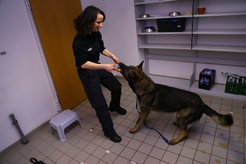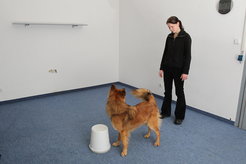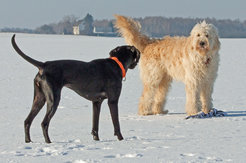
DogStudies Research Group
A major research goal of the Max Planck Institute of Geoanthropology is to answer questions about the evolutionary history of a broad range of biological and cultural phenomena.
DogStudies was established in 2016 to experimentally study the domestic dog (Canis familiaris). Dogs provide a very interesting model for investigating the evolution of cognitive processes and for understanding the process of domestication. The fact that dogs have been living with humans for at least 15,000 years may have led to the selection of cognitive abilities by humans, or even the co-evolution of dogs’ cognitive abilities with those of humans. We know already that dogs have developed unique skills in the communicative domain. We are now particularly interested in how dogs and humans cooperate with each other and how this has developed during evolution.
Dog research at the Max Planck Institute is strictly observational. There is no invasive research of any kind. We give the dogs various tasks to solve and observe how they interact with their environment, other dogs or humans. There is always a reward, usually a treat or a toy.
Main Research Topics
Dog-human communication

The main question is how flexible dogs’ understanding of human communication is. For example, dogs are more skilful in making use of human pointing gestures than other species. To test this skill, food is hidden in one of two cups without the animal seeing. Then it gets a cue from a human experimenter pointing to the correct cup. Dogs do not only use such gestures, but they are also able to indicate to humans where there toys are hidden - even without special training. We are now also investigating how dogs understand human words.
Functionality of the human-dog relationship

Here we would like to learn more about the relationship between the dog and its owner. We are interested in the factors that influence how well the animal-human team functions. This functionality plays a particularly important role for service dogs and other working dogs. That is why in this project we test not only normal family dogs, but also various working dogs such as police dogs, rescue dogs or assistance dogs.
Personality of the dog

It has long been assumed that dogs have different personality traits. These do not only depend on the breed, but also on the individual character of the dog. We seek to determine how exactly the characteristics of a dog differ from a complex human personality and how to make them measurable by psychological tests. This involves both owners answering questionnaires about their dog and testing how the dog behaves in different situations.
Metacognitive abilities

The main question is whether dogs have access to their own perceptual and knowledge states. Here, the focus is not on what dogs understand about others, but on what dogs know about themselves. For example, there is the question of how they remember and whether they are aware of what they have seen in the past. Do they know when they do not know something?
Cooperation

It’s clear that dogs have been domesticated to support human needs, but are they also able to coordinate activities of their own? In our studies concerning cooperation, we investigate whether dogs cooperate both with each other and with other species, such as humans. Do dogs coordinate those activities with others which they cannot do alone? Are they aware of their partners' role during this process? Is there a motivation to help humans? Do dogs recognise, that humans need help to achieve a goal, and do they then know how to support them?
Smell and cognition

It is well known that dogs have an excellent nose. Here we investigate how dogs perceive the world with their excellent olfactory sense and what they understand about their perceptions. Do they, for example, have a representation of something or someone when they smell it? How do they follow a trail? The central question is how dogs` incredible sense of smell and their cognitive skills are linked together.
Cultural Differences

Most scientific knowledge about the cognitive skills of dogs was established in Western societies. However, most dogs in the world do not live as they do in Europe and North America. Therefore, we want to investigate the relationships between dogs and people in non-Western societies and what functions dogs fulfill. Another question is whether their cognitive abilities are universal or influenced by their relationships to humans.
Sensitivety towards humans

Dogs are constantly observing their humans. The question here is how they assess human behaviour and what they conclude from it. For example, we know from many studies that dogs are sensitive to what humans can see and hear. We are now investigating whether dogs recognise intentions and whether they perceive and understand human emotions.
What humans know about dogs

Over the long history of their domestication, dogs have evolved special skills to read and react appropriately to human behavior. The question here is whether we are also skilled at reading dog behavior. Therefore, we test humans in this project. For example, we investigate how humans with different levels of experience with dogs assess dog emotions and communicative behavior.








